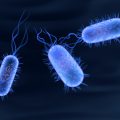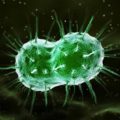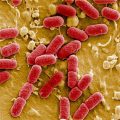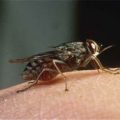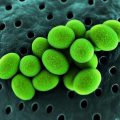What are bacteria?
According to the calculations of scientists in the human body is from 500 to 1000 various types of bacteria or billions of such "residents", and their total weight in the body can reach 4 kg.
Most of these microorganisms (up to three kilograms) is in the intestines, and the rest live on the skin, urinary tract and other organs. From the whole mass of bacteria, living in the human body, 99% – useful, but only 1% – harm the body.
Pathogenic bacteria are normal (ie. natural) intestinal microflora, stomach, vagina, oral. But with a large population, bacteria are able to release a sufficient amount of toxins into the body., to cause poisoning and disease in humans.
There are also such bacteria, which cause diseases, immediately after ingestion, even in small quantities. Such bacteria are not characteristic of the natural environment of microflora., and their poisons, secreted into the body, can become fatal to humans.
Consider the most common disease-causing bacteria, capable of harm to humans:
- In the mouth: streptococcus, Pneumococcus, staphylococcus, bacteria gingivalis, mycoplasma.
- On the skin: staphylococcus, streptococcus, fungi Microsporum, Trichophyton и Epidermophyton.
- On the genitals: fungus Candida, gonococcus, mycoplasma.
- In the intestines: staphylococcus, colon bacillus, mushrooms, enterococci.
The mechanism of action of bacteria is quite simple - as soon as the microbe gets into favorable conditions, its cells begin to multiply actively, simultaneously throwing out the products of their vital activity into the environment (toxins). These toxins have a destructive effect on all human organs., disrupting health and causing damage to all cells in the body.
What is the danger of bacteria?
The most powerful poisons are secreted by such bacteria., like a diphtheria bacillus, stryeptokokki, tetanus bacillus, staphylococci, colon bacillus. These bacteria produce poison only during their life..
Stryeptokokki cause a lot of serious infectious diseases, can cause severe kidney damage, joints, hearts. This type of bacteria produces toxins, damaging body tissues and contributing to the spread of infection to all human organs.
Gonokokki cause inflammation of the mucous membranes of the genitourinary tract and can provoke conjunctivitis in newborns.
staphylococci can cause bone disease, joints, hearts, lower and upper respiratory tract, urinary system and brain. Staphylococcus aureus affects almost all tissues and organs of a person without exception.. Doctors count more than a hundred diseases, which can be caused by staphylococcal infection.
Pneumococci often cause pneumonia, bronchitis, pleurisy, peritonitis, meningitis, arthritis.
colon bacillus promotes intestinal inflammation, Bladder, kidneys and other organs.
Mycoplasma and ureaplasma can cause the development of urethritis, pyelonephritis, bacterial vaginosis, inflammatory diseases of the uterus and appendages.
There are other bacteria, which are capable of poisoning the body even after their own death. These include pneumococci, tubercle bacillus, cholera, etc.
As a result of intoxication with the waste products of bacteria, a person can get typhoid., sore throat, anthrax, diphtheria, tuberculosis, tetanus and other dangerous diseases.
How to protect yourself from danger?
The ingestion of pathogenic bacteria does not necessarily lead to the development of the disease., some microorganisms can peacefully exist in the body for decades, without harming a person. Health problems arise then, when the body begins to weaken due to various reasons. There are reasons, which cannot be prevented (eg, genetic predisposition or advanced age), but most often a person deprives himself of protection from microbes.
Taking simple precautions, many dangerous diseases and long and exhausting treatment can be avoided. Such measures include the observance of personal hygiene and sanitary-preventive measures., eating properly and carefully processed foods, adherence to a healthy lifestyle. The last point is especially important., after all, immunity depends on a healthy lifestyle, and weak and impaired immunity is the root cause of the spread of bacteria and the development of diseases.



